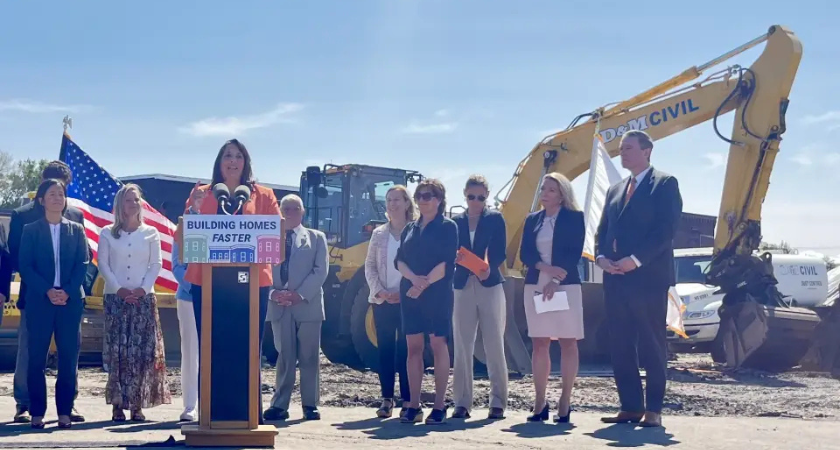
MEDFORD, Mass. – Facing one of the nation’s toughest housing shortages, Massachusetts leaders are moving to fast-track housing construction by shortening state environmental review timelines that often delay projects.
The state is projected to need an additional 222,000 housing units by 2035 to meet demand, lower costs, and make room for population growth. But navigating planning approvals and regulatory processes has slowed development, creating major barriers to addressing affordability.
.jpg)
On Tuesday, Gov. Maura Healey joined housing and environmental officials at a Medford construction site to announce draft regulations that would dramatically speed up certain reviews.
Under the new rules, qualifying housing projects will be able to complete a Massachusetts Environmental Policy Act (MEPA) review in just 30 days, compared to the months — and often more than a year — that developers currently face.
“This is about cutting red tape so we can cut more ribbons on more new homes and get to more reasonably priced housing around this state,” Healey said.
Not every project will qualify for the fast-track. The draft regulations specify that only projects meeting key criteria will be eligible. These include:
Lt. Gov. Kim Driscoll emphasized that environmental safeguards will remain intact. “The bottom line is we can maintain our strong environmental standards and build housing and also have nature-based solutions to address rising climate mitigation, rising climate needs and mitigation,” she said.
The announcement was made at 970 Fellsway in Medford, a former box factory where The Davis Companies is developing 289 new homes along with open space, parking, transit upgrades, and sustainable infrastructure.
Chief Development Officer Michael Cantalupa explained that even this relatively straightforward project required seven months for MEPA review. “And that was a relatively short and efficient review, for a MEPA review,” he noted. A faster process, he added, could significantly lower costs and speed delivery of badly needed housing.
.jpg)
The proposal has drawn support from both environmental and housing advocates, who see the dual benefit of addressing affordability while maintaining climate resilience.
“CLF looks forward to working with the administration as these draft regulations are refined to ensure they effectively advance climate resilience and clean energy affordability, expand access to affordable, safe housing, and continue to protect communities and the environment,” said Kate Sinding Daly of the Conservation Law Foundation.
The governor’s office also noted endorsements from the Trustees of Reservations and other advocacy organizations.
The Healey administration will collect public feedback on the proposal until October 31, with virtual hearings scheduled for October 14 and 15. If finalized, the regulations could mark one of the most significant efforts in decades to align housing growth with sustainability goals.
With construction costs rising and demand for affordable housing outpacing supply, the initiative represents a critical attempt to break through bureaucratic delays and deliver homes more quickly.
Originally reported by Katie Lannan in GBH News.